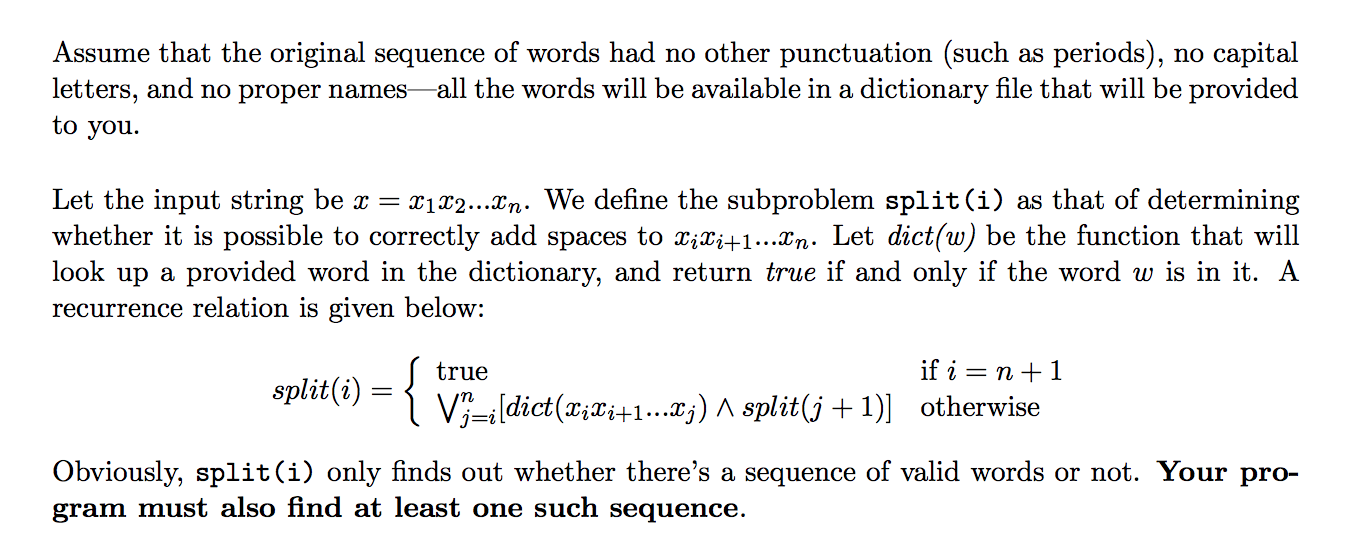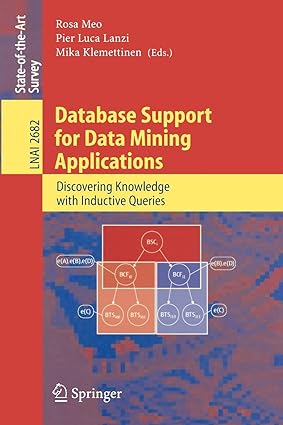Question
We want to devise a dynamic programming algorithm for the following problem: There is a string of characters which might have been a sequence of
We want to devise a dynamic programming algorithm for the following problem:
There is a string of characters which might have been a sequence of words with all the spaces removed, and we want to find a way, if any, in which to insert spaces that separate valid English words. For example, theyouthevent could be from the you the vent, the youth event or they out he vent. If the input is theeaglehaslande, then theres no such way. Your task is to implement a dynamic programming solution in the following ways:
iterative bottom-up version
recursive memoized version
 The program will read a text file from standard input. The name of the dictionary file should be hardwired in the code. We will be testing your program on a file named diction10k.txt, and your program will be tested in a directory containing that file.
The program will read a text file from standard input. The name of the dictionary file should be hardwired in the code. We will be testing your program on a file named diction10k.txt, and your program will be tested in a directory containing that file.
SAMPLE INPUT:
The first line of input is an integer C. This is followed by C lines, each containing a single string, representing a phrase to be tested.
3
theyouthevent
theeaglehaslande
lukelucklikeslakeslukeducklikeslakeslukelucklickslakesluckducklickslakes
SAMPLE OUTPUT:
phrase number: 1
theyouthevent
iterative attempt: YES, can be split
the you the vent
memoized attempt: YES, can be split
the you the vent
phrase number: 2
theeaglehaslande
iterative attempt: NO, cannot be split
memoized attempt: NO, cannot be split
phrase number: 3
lukelucklikeslakeslukeducklikeslakeslukelucklickslakesluckducklickslakes
iterative attempt: YES, can be split
luke luck likes lakes luke duck likes lakes luke luck licks lakes luck duck licks lakes
memoized attempt: YES, can be split
luke luck likes lakes luke duck likes lakes luke luck licks lakes luck duck licks lakes
In C, C++, or Python please.
Assume that the original sequence of words had no other punctuation (such as periods), no capital letters, and no proper namesall the words will be available in a dictionary file that will be provided to you. Let the input string be x = x122...In. We define the subproblem split(i) as that of determining whether it is possible to correctly add spaces to Lili+1...In. Let dict(w) be the function that will look up a provided word in the dictionary, and return true if and only if the word w is in it. A recurrence relation is given below: : s true if i=n +1 1 V1=i[dict(tili+1...X;) A split(j +1)] otherwise Obviously, split(i) only finds out whether there's a sequence of valid words or not. Your pro- gram must also find at least one such sequence. Assume that the original sequence of words had no other punctuation (such as periods), no capital letters, and no proper namesall the words will be available in a dictionary file that will be provided to you. Let the input string be x = x122...In. We define the subproblem split(i) as that of determining whether it is possible to correctly add spaces to Lili+1...In. Let dict(w) be the function that will look up a provided word in the dictionary, and return true if and only if the word w is in it. A recurrence relation is given below: : s true if i=n +1 1 V1=i[dict(tili+1...X;) A split(j +1)] otherwise Obviously, split(i) only finds out whether there's a sequence of valid words or not. Your pro- gram must also find at least one such sequenceStep by Step Solution
There are 3 Steps involved in it
Step: 1

Get Instant Access to Expert-Tailored Solutions
See step-by-step solutions with expert insights and AI powered tools for academic success
Step: 2

Step: 3

Ace Your Homework with AI
Get the answers you need in no time with our AI-driven, step-by-step assistance
Get Started


